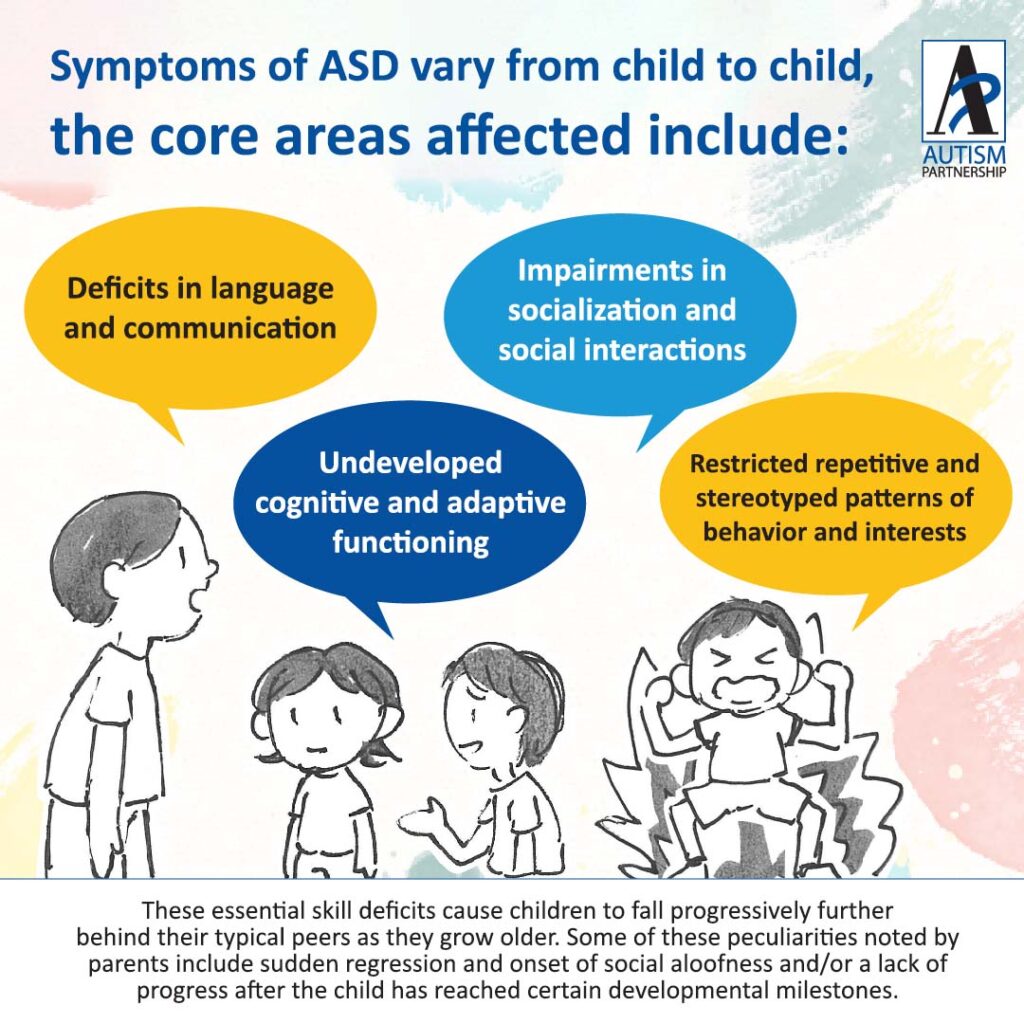Tips for spotting early behavioral traits and connect with an Aba Therapist Near Me
Tips for spotting early behavioral traits and connect with an Aba Therapist Near Me
Blog Article
Key Symptoms And Signs to Identify in People With Behavior Autism
When you encounter somebody with behavior autism, recognizing vital symptoms and signs is crucial. You could see obstacles in social communications and interaction, along with a solid requirement for routines. In addition, sensory sensitivities can result in overwhelming experiences. Understanding these traits can improve your assistance and treatments, yet there's more to uncover concerning exactly how these behaviors show up in day-to-day circumstances. Allow's explore what these indicators really look like.
Challenges in Social Interactions
When you engage with a person on the autism range, you may notice they deal with social cues and interaction. These difficulties can make social communications really feel frustrating for them. You may see them avoiding eye contact or standing too close or too away throughout discussions, which can produce misconceptions. They could not detect body movement or facial expressions, making it harder for them to determine just how others are feeling.
When they do involve, they could chat about their rate of interests in great information without seeing if you're interested. Understanding these difficulties can aid you come close to communications with empathy and perseverance, promoting an extra comfortable atmosphere for both of you.
Trouble With Verbal and Non-Verbal Communication

Non-verbal interaction can be even more difficult. You may see an absence of eye call or restricted use motions, which can make interactions feel uncomfortable. Faces might not always align with the discussion, resulting in complication regarding their feelings. Acknowledging these signs is crucial, as it assists you better assistance and engage with individuals on the autism spectrum. By comprehending their communication difficulties, you can cultivate a lot more significant links and supply a much more helpful environment.
Repeated Habits and Routines
Interaction obstacles typically come with various other indications of autism, such as recurring habits and a solid choice for regimens. You might discover that individuals with autism typically take part in specific, repeated activities, like hand-flapping, shaking, or duplicating phrases. These actions can offer convenience and a sense of control in a commonly frustrating world.
When they follow an organized timetable,Regimens are just as essential; many people prosper. You may find that modifications to these regimens can lead to substantial distress. As an example, if they have a daily routine of consuming breakfast at a details time or following a certain route to college, any kind of disturbance can trigger stress and anxiety.
Recognizing these patterns aids you recognize their habits and offer support. By suiting their requirement for routine and allowing recurring activities, you can produce a more comfortable atmosphere that reduces their obstacles.
Sensory Sensitivities

Typical Sensory Triggers
Sensory sensitivities can substantially influence every day life for people with autism, as particular stimuli typically set off overwhelming reactions. Typical sensory triggers include loud noises, intense lights, and strong scents. You could discover that unexpected noises, like sirens or alarms, create anxiety or distress. Similarly, fluorescent lights in shops can feel extreme and uneasy. Textures can also play a significant duty; harsh materials or certain food structures might be excruciating for you. Furthermore, crowded places can bewilder your detects, making it hard to loosen up or focus. Recognizing these triggers can help you manage your atmosphere better. By understanding what influences you, you can take actions to minimize pain and enhance your everyday experiences.
Behavior Feedbacks Described
Comprehending your behavioral responses to sensory sensitivities is crucial, as they commonly expose just how you interact with the globe. You could observe that specific audios, lights, or textures overwhelm you, causing anxiousness or pain. When faced with these stimuli, you could withdraw, cover your ears, or perhaps react strongly. These responses aren't simply peculiarities; they're your method of managing overstimulation. You may also find on your own looking for certain sensory experiences, like deep stress or silent settings, to help ground yourself. Acknowledging these patterns aids you understand your demands better and can guide how you communicate them to others. By recognizing your sensory sensitivities, you can function in the direction of producing an environment that feels extra comfortable and convenient for you.
Coping Approaches Review
Acknowledging your sensory sensitivities is simply the first step; currently it's time you could look here to explore coping approaches that can help you manage those experiences effectively. Beginning by developing a sensory toolkit tailored to your demands. Establishing an organized routine can also offer predictability, minimizing stress and anxiety around sensory overload.
Limited Passions and Focus
While numerous individuals develop a variety of passions, those with autism frequently demonstrate limited rate of interests and an intense concentrate on certain subjects. You could discover that someone with autism can spend hours delving right into their favored topic, whether it's a specific kind of train, a certain motion picture, or a scientific concept. This extreme focus isn't just a pastime; it can come to be a central component of their identity and social communications.
You may find that conversations revolve around these rate of interests, and they might struggle to involve in more comprehensive subjects. For them, these focused passions give convenience and a sense of proficiency. While it is essential to encourage expedition of brand-new topics, valuing their passions is similarly essential. By recognizing and recognizing these restricted passions, you can cultivate a supportive atmosphere where they really feel valued and recognized, permitting even more purposeful links and interactions.
Emotional Law Troubles
People with autism typically deal with obstacles in psychological law, which can be affected by their intense concentrate on navigate to this site specific passions. You could see that when an individual is deeply engaged in a favored activity, they can experience solid emotions, whether exhilaration or frustration. When points do not go as planned., this intensity often makes it tough for them to change equipments or manage their feelings - Autism Behavioral Therapy.

Variability in Developmental Turning Points
When it comes to developmental landmarks, you'll see that people with autism often reveal a wide array of variability. You may see a youngster stand out in language skills yet struggle with social interactions.
It's crucial to recognize that each person's journey is distinct. Observing these patterns can assist you understand their toughness and requires much better.
Often Asked Concerns
Exactly How Is Autism Diagnosed in Kid and Adults?
To detect autism in grownups and children, experts evaluate habits, communication abilities, and social communications. They commonly make use of standard examinations, meetings, and observations to figure out if an individual satisfies the criteria for autism spectrum problem.
Exist Various Sorts Of Autism Spectrum Disorders?
Yes, there are different types of autism spectrum disorders, consisting of Asperger's syndrome and prevalent developmental disorder-not or else specified. Each kind varies in intensity and characteristics, so comprehending these differences can aid you much better assistance individuals with autism.
What Treatments Are Efficient for People With Autism?
When taking into consideration reliable therapies for individuals with autism, you'll discover alternatives like Applied Habits Analysis, speech treatment, and job-related therapy. Each technique can help boost communication, social skills, and day-to-day operating tailored to specific requirements.
Can People With Autism Lead Independent Lives?
Yes, people with autism can lead independent lives. With the appropriate assistance, skills training, and sources, you can help them create self-sufficiency, handle everyday jobs, and grow in various settings, promoting their self-reliance.
Just How Can Families Support Liked Ones With Autism?
You can sustain your liked ones with autism by creating a structured environment, encouraging their interests, practicing patience, cultivating communication, and promoting social abilities. Commemorate their accomplishments, despite how tiny, and build a helpful community.
Although many people on the autism range can utilize and comprehend language, they frequently face substantial obstacles with both verbal and non-verbal communication. Identifying these signs is vital, as it aids you far better support and engage with individuals on the autism spectrum. You might observe that people with autism frequently engage in particular, repetitive actions, like hand-flapping, rocking, or repeating phrases.Sensory level of sensitivities can considerably impact day-to-day life for people with autism, as particular stimuli typically set off frustrating reactions.When it comes to developmental landmarks, you'll see that people with autism often reveal a broad variety of variability.
Report this page